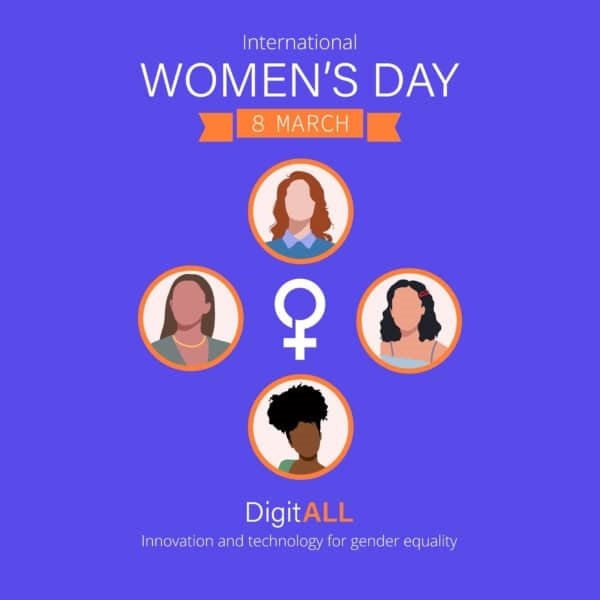Martech is the intersection of marketing, where women hold 48% of all jobs, and tech, which is only 27% women.
Today is International Women’s Day (IWD) and this year’s theme, “DigitALL: Innovation and technology for gender equality,” should resonate with the martech community.

“IWD 2023 is a great opportunity for businesses to reflect on the progress they have made with their diversity and inclusion initiatives, and how far they still have to go,” says Lauren Wetzel, chief operating officer of InfoSum, a data collaboration platform vendor.
So, we thought we’d take Wetzel’s suggestion and look at the status of gender equality in martech.
Martech is the intersection of two sectors with very different gender profiles. Women held 47.8% of all marketing jobs in the U.S. in 2021, which is 1.7 percentage points higher than they do in the general workforce. In stark contrast, women held just 26.7% of tech jobs in the U.S. that year.
Martech crosses business sectors. Because martech is a function and not a standalone business sector, it is probably impossible to figure out its gender profile. However, our 2022 Salary and Career Survey does offer some martech-specific data:
- Women earn an average of 30% less than men in martech jobs at all levels. That’s worse than the overall IT sector, where women earn an average of 28.9% less than men, according to the U.S. Census.
- Men hold 56% of director-or-above roles.
- 29% of men were promoted in the last six months, compared to 24% of women
However, martech practitioners tend to see it as looking more like tech than marketing. This means that the number of women employed in the field is falling.
“Mass layoffs have been hitting the tech industry hard recently, but it appears to be affecting women more than men,” says Alex Theriault, data and customer solutions expert and GM, Spherical at Lotame. “Research has found that women are 65% more likely to lose their jobs during these ongoing layoffs, which is especially difficult since they make up disproportionately less of the tech workforce.”
This comes after the pandemic, which took a significant toll on the number of women in tech.
Gender diversity in tech leadership fell from 86% in 2020 to 59% in 2021, according to a BCG study of the pandemic’s impact on female leaders in technology. This is likely in part because of pandemic-related caregiving which fell heavier on women. Some 44% of women reported spending well over 20 hours per week on caregiving as compared to 33% of men.
Women doing more at work. That split is nearly identical to who took on more duties at work during that time: 43% of women versus 33% of men, according to a TrustRadius report. It’s no wonder 57% of women felt more burnt out at work than before the pandemic, according to the report. Only 36% of men said they felt this way.
Additionally, a study by BuiltIn found:
- 39% of women view gender bias as a primary reason for not being offered a promotion.
- 66% of women report there is no clear path forward for them in their career at their current companies.
These are all reasons why 20% of women in tech are thinking of quitting.
Why we care. This is bad for business. The more gender and racial diversity a company has at all levels, the better it performs. This has been shown in a huge number of studies.
- Companies with the highest number of women on top management teams have a 35% higher return on equity and 34% higher total return to shareholders than companies with the lowest number. (Catalyst)
- Ethnically diverse companies are 35% more likely to yield higher revenue, while gender diverse companies are 15% more likely to yield higher revenue. (McKinsey)
- The top 100 Fortune 500 companies have more diverse boards than the other 400 companies on the list. (Forbes)
- High growth brands (annual revenue increase of at least 10%) are 1.9x more likely to have diversity-and-inclusion related talent objectives than negative growth brands (Deloitte)
What can be done? There are concrete steps for companies can take to help women succeed in the workplace. These include:
- Formal mentorship programs for women and for women of color
- Emergency backup child care services
- Sharing diversity metrics outside the organization
- Setting numeric goals for race/ethnicity/gender representation in senior management
- Training managers in facilitating conversations around diversity issues
- Training managers on how to make sure promotions are fair and equitable
These are all things being done by top performing companies, according to McKinsey.
“Another important way to empower women in the workplace is to encourage more cross-pollination within departments,” says Alex Theriault. “Within certain organizations, certain divisions lean towards one gender over another — for example, marketing or customer support leans female, while engineering leans male. Jobs or departments that lean male receive higher pay than those that lean female, and yet teams that buck gender norms and are more diverse are more likely to perform better.”
Fortunately, women can turn to organizations outside of work which are already creating change in business.
“The martech industry is changing before our eyes and with that the shape of leadership,” says Gabrielle Turyan, director of product marketing at Digital Remedy, a digital media solutions company. “Pivotal organizations like SheRunsIt and inter-organizational mentor groups are paving the way for women like myself to have a seat at the table.”
The post International Women’s Day 2023 and the martech community appeared first on MarTech.
MarTech(12)






